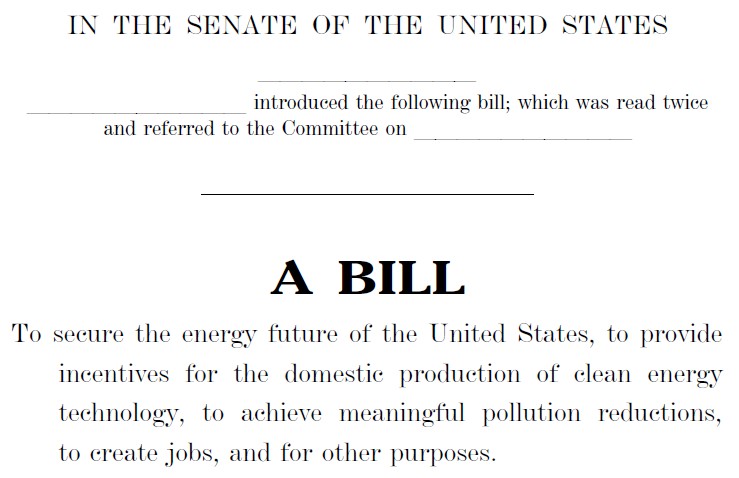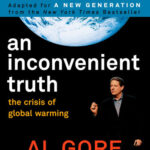De Kerry-Lieberman Climate Bill is afgelopen woensdag aan de Amerikaanse Senaat gepresenteerd. Het is het antwoord van de Senaat op de Waxman-Markey Bill (American Clean Energy and Security Act) die in juni 2009 door Congress werd geloodst. Destijds was meteen duidelijk dat de wet nooit door de Senaat zou worden aangenomen. De Senatoren Barbara Boxer en John Kerry stonden in eerste instantie op om de zaak te fixen. Zij loodsten hun wetsontwerp door het Senate Committee, waarin de republikeinse Senator James Inhofe, de sceptische eend in de bijt is. Vervolgens was het driemanschap Kerry-Lieberman-Graham een eind op weg een politiek heel misschien haalbaar plan in elkaar te timmeren. Totdat de Republikein Lindsey Graham zich onlangs ijlings terugtrok om zich te kunnen focussen op de immigratiewetgeving (link).
Republikeinen krijgen steevast gedonder met hun achterban als ze hun nek te ver uitsteken op klimaatgebied. Die realiteit lijkt ook Senator Graham te hebben ingehaald. Hij steunt de nu gepresenteerde wet van het overgebleven Democratische duo Kerry Liebermann nog wel, maar zegt wel het volgende:
It’s not a global warming bill to me. Because global warming as a reason to pass legislation doesn’t exist anymore. There is no bipartisan support for a cap-and-trade bill based on global warming. Bron
Wat moeten we nu met deze wet die het waarschijnlijk niet gaat halen (link) ondanks de sterke support van President Obama. Het is uiteindelijk ondenkbaar dat de Amerikaanse politiek ja zegt tegen een ‘cap & tax” programma dat de belastingbetaler 69 tot 145 miljard dollar per jaar gaat kosten met nog jaarlijkse stijging van 6 tot 8%. Zelf heb ik een kwartiertje door het document gescand. Ik kom dan zo veel onzinnige dingen tegen dat ik het niet meer bij kan houden. Wat een waardeloze tekst! En geen wonder dat fanatieke milieuactivisten zoals James Hansen fel tegen zijn.
Misschien moeten we het maar als tijdsbeeld voor historici benaderen. Bijvoorbeeld vaststellen dat de door Angela Merkel losgelaten 2 graden doelstelling door de Amerikaanse liberals nog wel wordt omarmd. Grappige is ook dat de wet alleen spreekt over “climate change” en niet over “anthropogenic climate change”. En “climate change” wordt daarbij niet eens gedefinieerd. Het kan letterlijk van alles zijn. Download de wetstekst zelf (link) en speur eens mee naar vermakelijke passages!
Hieronder een korte passage waarin onder meer wordt gesteld dat de zeespiegel stijgt als het zeeijs smelt.
If unchecked, the impact of climate change will include widespread effects on health and welfare, including
(A) increased outbreaks from waterborne diseases;
(B) more droughts;
(C) diminished agricultural production;
(D) severe storms and floods;
(E) heat waves;
(F) wildfires; and
(G) a substantial rise in sea levels, due in part to
(i) melting mountain glaciers;
(ii) shrinking sea ice; and
(iii) thawing permafrost;
The most recent science indicates that the changes described in paragraph (G) are occurring faster and with greater intensity than expected; Military officials, including retired admirals and generals, concur with the intelligence community that climate change acts as a threat multiplier for instability; and presents significant national security challenges for the United States; massive portions of the infrastructure of the United States, including critical military infra structure, are at risk from the effects of climate change; impacts are already being felt in local com munities within the United States, as well as by at risk populations abroad; the Copenhagen Accord, which builds on the agreements reached in the Bali Action Plan developed under the United Nations Framework Convention on Climate Change done at New York on May 19, 1992, recognizes the need to limit the increase in global average temperatures to within 2 degrees Centigrade as a necessary step to prevent the catastrophic consequences of climate change; and the United States should lead the global community in combating the threat of global climate change; and reaching a robust international agreement to address climate change under the United Nations Framework Convention on Climate Change, done at New York on May 9,1992 (or a successor agreement).
[….]
Congress finds that
(1) climate change poses a significant threat to the national security, economy, public health and welfare, and environment of the United States, as well as of other countries;
(2) reviews of scientific studies, including by the National Academy of Sciences and the Intergovernmental Panel on Climate Change, demonstrate that climate change is the result of the combined anthropogenic greenhouse gas emissions from numerous sources of all types and sizes;
(3) each increment of emission, when combined with other emissions, causes or contribute materially to the acceleration and extent of climate change and the adverse effects of climate change for the lifetime of the gas in the atmosphere;
(4) accordingly, controlling emissions in small as well as large quantities is essential to prevent, slow the pace of, reduce the threats from, and mitigate climate change and the adverse effects of climate change;
(5) because greenhouse gas emissions induce climate change, greenhouse gas emissions cause or contribute to injuries to persons in the United States, including
(A) adverse health effects, such as disease and loss of life;
(B) displacement of human populations;
(C) damage to property and other interests relating to ocean levels, acidification, and ice changes;
(D) severe weather and seasonal changes;
(E) disruption, costs, and losses to business, trade, employment, farms, subsistence, aesthetic enjoyment of the environment, recreation, culture, and tourism;
(F) damage to plants, forests, land, and waters;
(G) harm to wildlife and habitat;
(H) scarcity of water and the decreased abundance of other natural resources;
(I) worsening of tropospheric air pollution;
(J) substantial threats of similar damage;
(K) other harm;
(6) the fact that many of those effects and risks of future effects of climate change are widely shared does not minimize the adverse effects individual persons have suffered, will suffer, and are at risk of suffering because of climate change;
(7) the fact that some of the adverse and potentially catastrophic effects of climate change are at risk of occurring and not a certainty does not negate the harm persons suffer from actions that increase the likelihood, extent, and severity of such future impacts;
8) countries of the world look to the United States for leadership in addressing the threat of and harm from climate change;
(9) full implementation of this title is critical to engage other countries in an international effort to mitigate the threat of and harm from climate change; and
(10) climate change and related adverse effects are occurring and are likely to continue and increase in magnitude, and to do so at a greater and more harmful rate, unless this title is fully implemented and enforced in an expeditious manner.
Gaap!







die van het krinpende zeeijs is inderdaad alleen al een lachertje.
Dat politici met zo´n wet kunnen komen aanzetten, met zulke rechtvaardigingen, is een gotspe.
Ik hoop op een knaller van een nederlaag, zodat die klimaathetze eindelijk eens ophoudt en men weer met zinvolle investeringen beziggaat die een eind maken aan de economische crisis.
Windmolens voor de aanmaak van waterstof bijvoorbeeld, samen met de grootschalige introductie van de waterstofmotor voor het transport. De bevordering van kernenergie. Etc